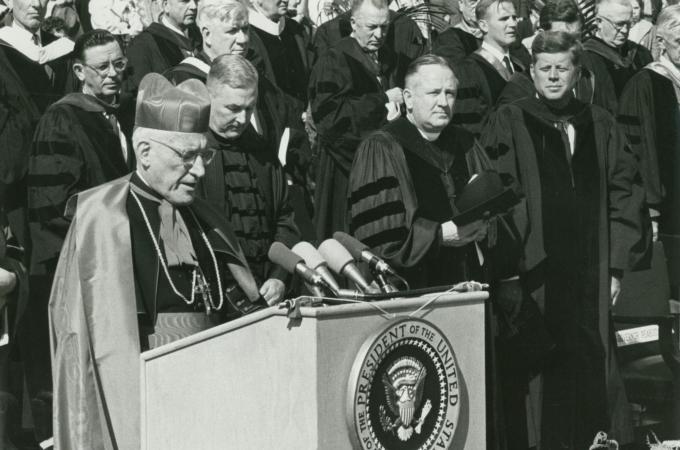Boston College's centennial commencement
At the Boston College commencement on April 20, 1963, Cardinal Richard Cushing of Boston was one of the many special guests invited to help mark the college's centennial that year. President John F. Kennedy was the main speaker, but Cardinal Cushing was also given an opportunity to deliver a few brief remarks, a copy of which resides in the archive.
Cardinal Cushing begins stating that although Boston College was founded by the Society of Jesus, it has always maintained close ties to the Archdiocese of Boston. In the early 19th century, the College of the Holy Cross in Worcester, Massachusetts, had already been established as a place where young men could study and, it was hoped, eventually enter a seminary and return to serve the diocese as priests: a scarce commodity at the time.
Still, it was hoped that another Catholic college would be established in the City of Boston itself to offer an affordable education to the growing number of poor Catholic immigrants residing there. With the help of the Society of Jesus, and in particular Father John McElroy, SJ, Boston College opened in the city's south end in 1863.
Both colleges performed their intended role, Cardinal Cushing states in his address, between the two supplying most of the seminarians who attended St. John's Seminary in Brighton, founded in 1884. In fact, Cardinal Cushing himself had followed this oft-treaded path, spending two years studying at Boston College before St. John's Seminary, neighboring institutions after Boston College moved to Chestnut Hill in 1913.
While the two institutions are closely connected, Cardinal Cushing continues, it is wrong to conclude that their only interest is religious, or that they evaluate the success of the academic programs through this lens. While the Church directs its followers towards the eternal world that follows the present one, there are more immediate concerns, such as "personal integrity" and "public service," that will make this world a better place. He emphasizes that it is less important to be "loyal and unswerving" to a religious doctrine, because "to be genuinely religious means to be conscientious and upright as a citizen."
The importance of institutions such as Boston College, he states, are to prepare young people for positions of responsibility, setting high standards in academics but also in character and values that will shape the society they enter upon leaving the classroom.
- Thomas Lester is the archivist of the Archdiocese of Boston.



















